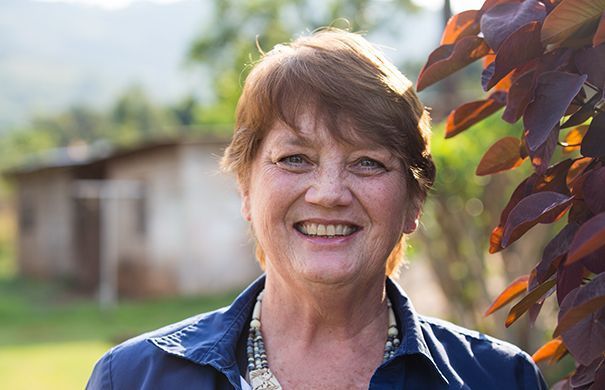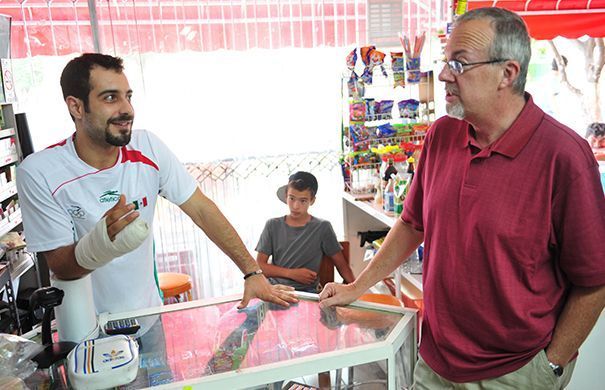Deb Prentice should not be a missionary.
She should be doting on grandchildren. She should be finishing her career as a nurse practitioner. She’s just running away from the death of her husband.
Well, that’s what people told her anyway.
Deb originally thought she would go to the mission field in her 20s, as a newlywed. But then she and her husband had to care for her father-in-law. Then they started a family. Then they had grandkids.
When God finally gave her the go-ahead in 2007, Deb was more than ready. But to be fair to her naysayers, moving to rural Africa in your 50s isn’t easy.
“Normally you think of people leaving the grandparents behind, not the grandparents leaving the grandchildren,” Deb says. In a season when many people settle in, Deb was leaving behind her family and decades of memories in her small town.
When Jann and Paul Vander Mey moved to Mexico in their 50s, they faced similar challenges. Now in their 60s, Jann says, “We can already feel that we’re slowing down.”
And yet, all three say God has blessed their time in their older missionary age — not just in spite of their age, but because of it.
They had more connections when it came time to raise support . Over the years, they’d already learned how to live on less. Perhaps the biggest thing? Their host cultures have deep respect for older people.
“Because of my age, people are willing to listen to me,” Deb says. “They’re willing to come to me. … It’s ‘Oh, she’s got eight grandchildren. She’s someone that you respect.’”
So how do you reap the benefits of missions in your golden years while also navigating the challenges? It’s not easy, but Deb, Jann and Paul have seven tips to help you get started!
1. Make a plan for staying in touch.
The thought of leaving behind kids and grandchildren can be heartbreaking. But with a little planning, you can still build — and maintain — those relationships.
Jann, Paul and Deb all try to come home at least once a year. The rest of the year, they use FaceTime or Skype so they can see their family members’ faces. They use Amazon to send birthday gifts and Christmas gifts. They send photos of everyday events.
Deb also makes sure she and her grandkids have photos of themselves together, so they can solidify the memories and the relationship.
Each small touch helps. And making a plan will help you stay on track when life gets busy.
2. Figure out healthcare before you go.
Deb is frank when she talks about healthcare in her host country: “If I have a heart attack, I’ll probably die.”
She finds peace in trusting God, but she also recommends thorough preparation before leaving your home country: Bring a year’s supply of medication. See if your doctor will let you contact them if you need something overseas. Bring a copy of your health records.
It also helps to talk with missionaries on the field — or even visit — so you can fully anticipate your needs.
For Paul and Jann, a short-term trip actually allayed any fears. They discovered that healthcare in Mexico is high-quality and affordable. They easily pay out of pocket for their needs.
3. Be willing to change your job.

Despite her nursing background, TEAM missionary Deb Prentice followed God’s leading to become a Bible professor on the mission field. Photo by TEAM
This might seem obvious. Of course your job is changing. You’re becoming a missionary !
But often, we assume that the new missionary job will mirror your old professional job. And that assumption can close the door on amazing opportunities.
Deb worked in medicine for 25 years, so her sending organization, TEAM , thought she’d be a perfect fit for a mission hospital in Zimbabwe . But when she went there on a short-term trip, Deb says, “God was very clear that I was to go and teach the Bible.”
It was a strange revelation, but Deb obeyed. She went to seminary and returned to Zimbabwe as a Bible college professor.
It’s not at all what she expected. But through her role, Deb has mentored students and pastors, influencing the Zimbabwean church for a generation. And she has no plans to stop.
“I love what I do here. I couldn’t find a job like this in the States,” Deb says.
4. Don’t be afraid to look silly.
Life in a new culture and language is humbling — especially in your 50s or 60s. But Jann and Paul have found that God works through their inexperience.
Jann teaches a Bible study in Spanish, and she sometimes struggles to explain ideas. But her students love to help her figure out the language. And that mutual learning makes Jann more approachable .
“It shows that you’re just a common person. … You’re not perfect,” Paul says.“And that’s probably a good thing as you try to bridge the gap with people.”
In Zimbabwe, Deb made a point of asking people to tell her when she made cultural mistakes. As a result, she learned things in a few years that some westerners don’t learn in a lifetime.
5. Know your limits.
When you’re surrounded by younger missionaries, it’s easy to push yourself too far. Paul encourages missionaries to honestly assess how much energy they have for ministry.
After nearly eight years in Mexico, Paul says, “We’re gonna keep going, but it’s not going to be as fast a pace. It’s just not possible.”
In Zimbabwe, Deb watched friends ignore precautions, such as wearing long pants or spraying for mosquitoes — and nearly lose their lives as a result. The hard truth is that as they aged, they were more prone to infections and had a harder time fighting them off.
Don’t look at what the young people are doing, Deb says. Know your own body and take care of it. That will keep you on the field.
“You just realize … I’m not going to have that reserve I had when I was younger,” Deb says. “I can’t bounce back.”
6. Learn to minister right here, right now.

Before moving to Mexico, TEAM missionaries Paul and Jann began ministering cross-culturally in their own neighborhood. Photo by TEAM
Long before Jann and Paul felt called to Mexico, they got involved with their church’s outreach to Hispanic neighbors. The work taught them a lot about the culture — but it also built on the ministry mindset they would take to the field.
“I think if you are involved in serving the Lord already in the States , … that really helps because then you go to the field, and you’re just in a different place serving the Lord ,” Paul says.
With five degrees and decades of ministry under her belt, Deb says she’s spent her whole life preparing for missions . But preparation doesn’t have to be anything fancy.
“If there’s any idea of [going into missions], take some Bible classes, do some study, prepare yourself. Don’t just wait,” Deb says. “Get ready. And the more you prepare, the more God can use you.”
7. Know that it will change you.
Whether you go for a few years after retirement or for the rest of your life, your time on the mission field will vastly widen your worldview. And that’s one of the best things you could hope for.
“Even spending five years on the mission field is gonna totally change your perspective,” Jann says. “You’re gonna go back to the United States and never be satisfied to do what you were just doing before. That’s how it changed us. We know if we retire, we’re gonna go back, and we’re going to find a ministry to be involved in — different than what we’ve done in the past. We’re going to reach out to people, outside of the church. … I would challenge people to go for it.”




















